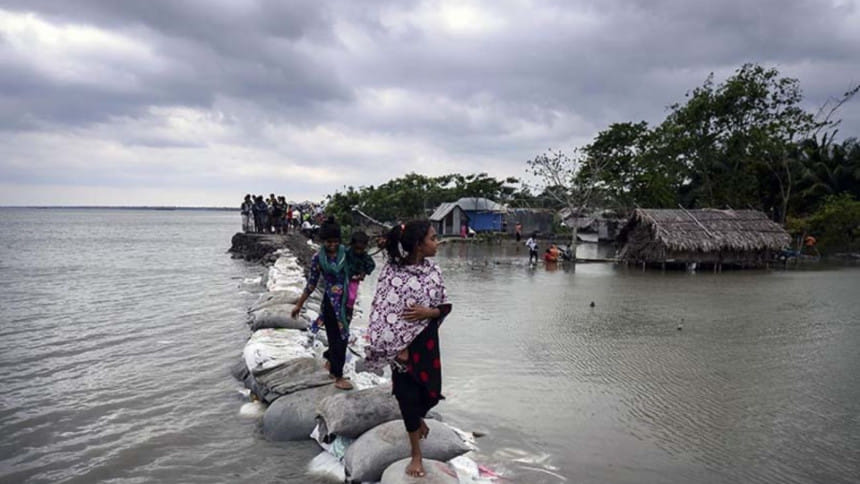Galloping Bangladesh: Emperor with no clothes?

Don't judge a book by its cover." So goes a popular cliché, though appraisals become more sanguine the more one opens the volume. Recent (April) reports about the country's top-flight economic growth-rates expose why heeding that message helps keep us on track.
One was by the World Bank, ranking Bangladesh among the world's top five countries. Another was from its sister-organisation, the International Monetary Fund, pushing the country even higher, among the top three. A third report from London's Centre for Economics and Business Research made an equally robust prediction of the world's 41st largest economy, Bangladesh, climbing to the 24th largest spot by 2033. Against the oborrodhs which drove foreign investors away five years ago, news like these can leave us giddy, unguarded. The country might hit all of these thresholds, but a host of creeping costs elsewhere tempers celebrative excesses.
Our economic magnus opus, the low-waged RMG (ready-made garment) industry, also carries a demonic flipside. From classical economics we know how low-wage production leverages grow, and though Bangladesh is not fully neoliberal, we exemplify some of its historically-confirmed seeds of decay. One is the skyrocketing spending we have gotten into. Splurging on construction may be critically needed (for infrastructure building), but conspicuous consumption may be taking the glow away too rapidly. These illustrate the "public" and "private" spending columns, respectively, in any account book. Sold-out Cox's Bazaar hotels depict the latter (even though a large proportion of guests work with refugees instead of fitting the "tourist" bill), as too travel abroad, especially to Bangkok, Kolkata, or Singapore. Spending boosts production, but also spikes imports. If borrowed, it also sows the seeds of a payment-postponement mindset: since spending on material possessions bring visible gratification and inflates our social value, indulgences win the day over restraints, opening the slippery road to non-performing loans (of which we are overflowing) and imposing unnecessary fiscal pressures.
As our own expenses diminish our own bank balances, or push our credit-card payments upwards, the country winces when this becomes contagious. With a stable income these irritants can be ironed out, but when even sustainable employment cannot be sustained, as against automation and crony capitalist practices, pain becomes our uninvited guest.
If we shift from the personal account balances to the macro-level, we will have to barter the emperor's robe to survive. Take, for example, the 1.2 million refugees we cater to. Numerous reports put the annual monetary costs at USD 800 million to USD 1 billion (these only for directly needed basic items, like food, shelter, medicine, and the like). Damages to the environment will be far higher, but since they involve long-term calculations, these festering issues will also be pushed to the back-burner while we savour our material expansion. With foreign contributions dwindling, at least one-third of that USD 1 billion must come from our own coffers, adding another curveball.
Surely one-third will not leave us naked. Yet, other forces lurk. Protecting those borders is one of them, spiking our security costs. Deploying Border Guards (once again) to St Martin's Island, and maintaining a functional army along the border and around the refugee camps, have helped push the military component of our gross domestic product (GDP) from USD 3.3 billion in 2016 to USD 3.4 billion. Considering we only allocated USD 2.4 billion to the military in 2013, only a superficial analysis would conclude that safeguarding refugees did not play a part in that hike. Except for 1975-6 and 1995-2000, our defence expenditures never really touched even 1.5 percent of our GDP, but that should not delude us into thinking the economy is not being impacted: any crisis would send those costs soaring through the ceiling, leaving us too close to the breakpoint.
Other elements also beg attention. Another World Bank report (in September 2018) puts our urban pollution costs at USD 6.5 billion annually (attributing 80,000 direct deaths at that to just this causation). This, while 75 percent of the country's wetlands get despoiled, imposes a steadily climbing environmental cost that will, let's say by mid-21st Century, come back to haunt us. By that time, according to a 2014 Asian Development Bank report, climate-change losses will account for 1.8 percent of our GDP annually, a figure far larger than our highest annual military expenditure proportion ever (thus far). Just to stave off further climate-change danger, that ADB report posits we will have to pay USD 89 million annually by the 2030s, climbing to USD 363 million by mid-century. When this century ends, according to that report, 8.8 percent of our GDP will be shielding our grandchildren's grandchildren from climate change concerns. We might feast like a king/queen, but our reputation to them may become as poor as a pauper's.
Nothing has been said of our multiple mega-projects: we need them, they are bottleneck-releasing investments, reflecting our changing, more upside identity. We will, however, have to cough up the cash to have them, from our own pockets, through taxes. Nor too have other routine transactional costs been mentioned, for example, to ramp up our educational and healthcare infrastructures, and to feed up to 200 million people later this century. In other words, the marginally bloated cost column of our ledger now will assume more obese proportions due to our graduation from a less-developed status into middle-income confines, while a future shift into a developed country by 2041 might expose to us how our fiscal and financial budget will be increasingly punctured.
Shifting from those secular macro-level developments into our own micro-level world, we get a better appraisal of this consumption cancer. Our trade deficit has the unique claim of being perpetually negative, hovering between 5 percent and 7.5 percent of our GDP since the mid-1980s, indeed doubling in size in only the last five-odd years.
How do we get out of this mess, that is, find a robe for the denuded royalty? Something unusual must creep into the cards: to become more of a rational consumer in what we purchase, consume, discard, and produce. Being penny-wise is not sufficient. Purchasing is what triggers production, so where that production takes place could be one consideration, and then, when the consumption is completed, efficiency and sustainability matter as much: whether recycling is possible (which not only cuts some of the accumulating pollution, but also opens up other environmental-friendly industries), if not personally, then for others. Should we end up discarding the leftovers? If so, how, when, where, and in what other ways can we turn to so as not to steal our children's future through pollution? Production is, of course, king, but diversified production might carry a magic we might completely miss if we just do not experiment, innovate, and jump out-of-the-box once in a while. In the final analysis, once we see ourselves as a cog in the wheel, a tree in the forest, or a Bangalee in the global commons, we might get the looks of a well-outfitted emperor/empress befitting his/her station.
Ramadan carries a message precisely for such an occasion: to revitalise by cutting back and conserving. Others have spoken how, as one of the year's biggest shopping moments arrives, every new upgraded cloth we purchase means that much more of the imperilled-environment we endanger, and for every delicious meat-based meal we savour, how much poorer the verdant country's grassland becomes. We could show our royalty credential by curbing our shopping instinct and taming our gluttony. The Eid fun would return resplendently to our own backyards.
Imtiaz A Hussain is the head of Global Studies & Governance Program at Independent University, Bangladesh (IUB).

 For all latest news, follow The Daily Star's Google News channel.
For all latest news, follow The Daily Star's Google News channel. 



Comments